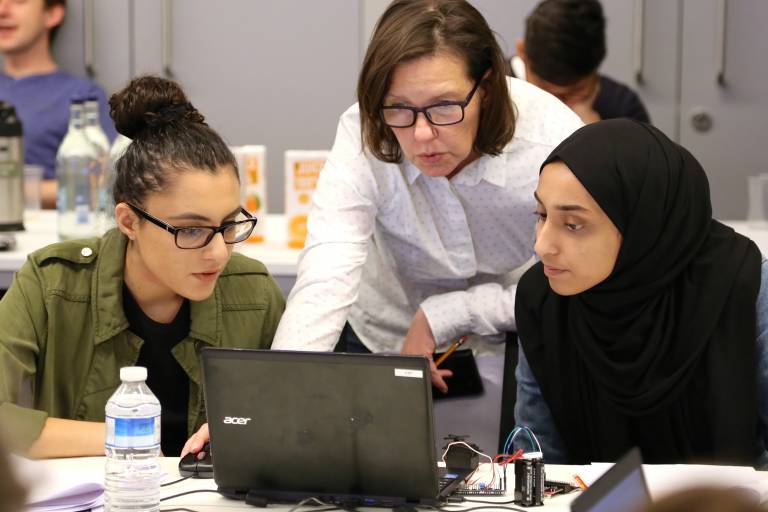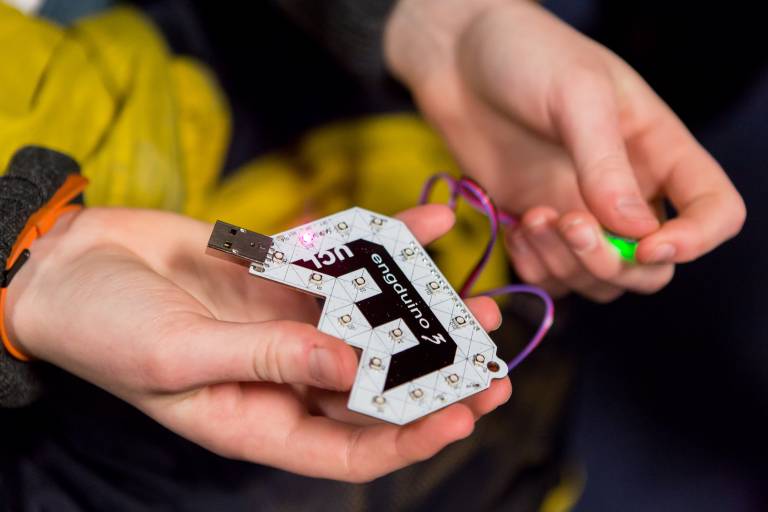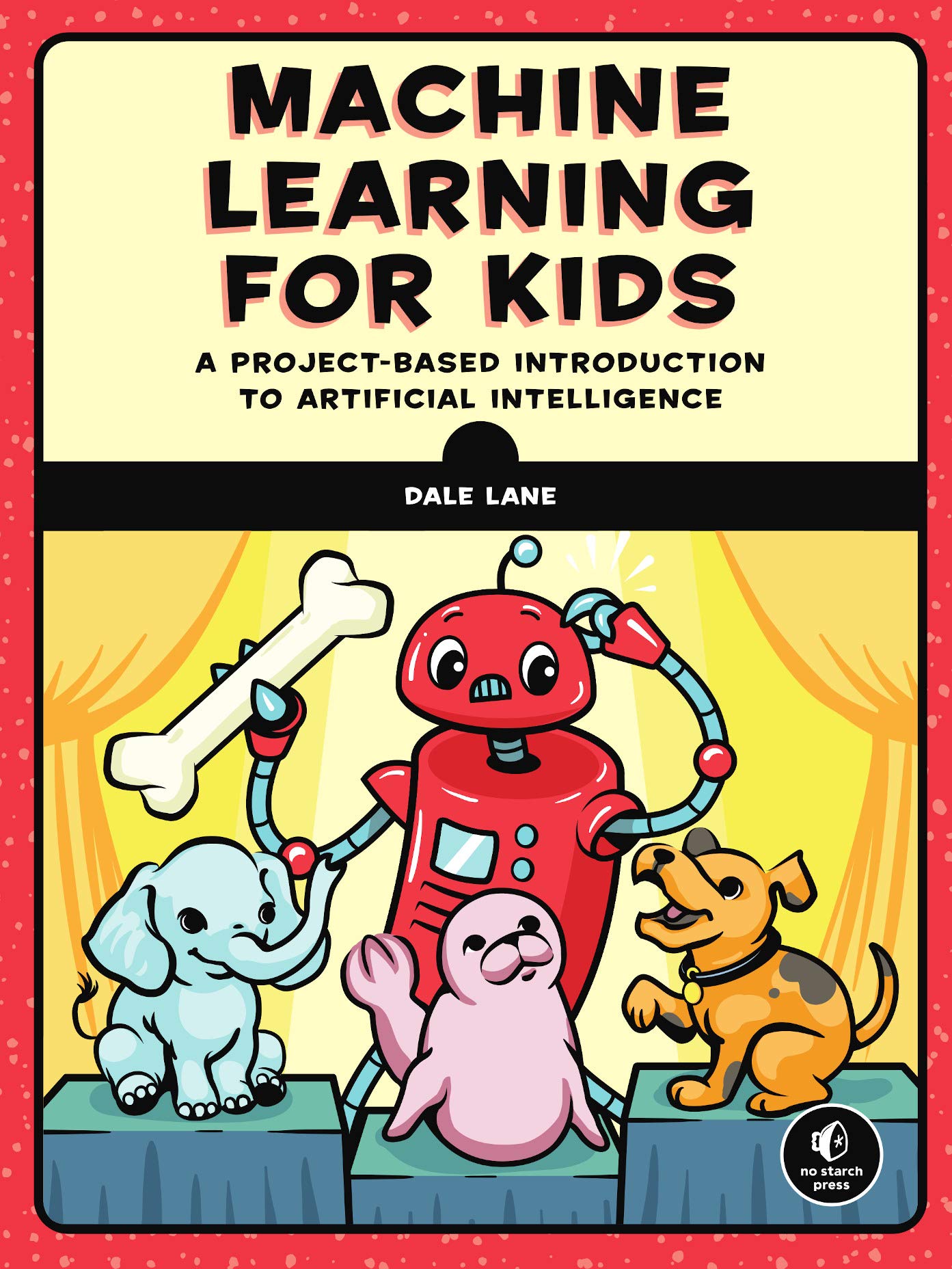How UCL Computer Science academic, Rae Harbird, has inspired young people into Computer Science through Schools Outreach.

For many years, in addition to her departmental responsibilities and her role in the Advanced Teaching Group, UCL Computer Science (UCLCS) Lecturer Rae Harbird has been leading on Schools Outreach activities.
Schools Outreach is an area fully supported by Head of Department, Professor Steven Hailes. Active participation and mentorship is strongly encouraged amongst academics and students in the department.
One of the priorities is to attract more young people to study Computer Science, as outlined in the Topol Review, which highlights that “we have to prepare students for jobs that have not yet been created, technologies that have not yet been invented and problems that we don't yet know will arise” (Andreas Schleicher, Director for Education and Skills at the Organisation for Economic Co-operation and Development).
Rae explains: "Our Head of Department committed us to encouraging under-represented groups to study Computer Science.
This has always appealed to me and I am a member of a team of people working in Schools Outreach in the department, a team that includes staff, PhD, undergraduate and postgraduate students.
Staff and students frequently commit their own time to outreach activities as these events aren't an integral part of their jobs. My core motivation is to shine a light onto the myriad of Computer Science applications for children and young people who may not know much about the subject.
It's highly rewarding to see them enjoying problem solving and the creativity that comes along with it."
Inspiring more women and girls into Computer Science
Women in engineering are vastly under-represented. According to an Engineering UK report (2018), they only represent 12.37% of all engineers in the UK. Rae speaks of the work currently in progress, to try to rectify this situation:
"We are continually thinking of ways to improve our schools outreach activities so that we reach more girls and young women and others who are under-represented in the field.
The ASPIRES research at the UCL Institute of Education has shown that students from under-represented backgrounds do not receive equal access to STEM education. This is compounded by the fact that the number of hours Computer Science, as a subject, is taught in schools is actually falling significantly.
All our schools outreach work conforms to UCL's 50:50 strategy in which overall participation must have an equal proportion of males and females.
We design our events carefully, emphasising the cross-disciplinary nature of computer science. Computing can be applied in any domain, and devices such as the BBC Micro:bit have enabled us to create interesting projects in bio-inspired robotics, wheelchair design and water conservation that are suitable for both the beginner and those with more knowledge.
This allows students to see that Computer Science is so much more than the stereotypes they encounter in everyday life."
Embedding Computer Science into the curriculum
New ‘computer code' classes became a part of the 2014 primary curriculum and coding syllabus' added to secondary schools across the UK. The new founded curriculum intends to aid young people in using technology and inspire more to seek careers in computing. It also created a necessity for training teachers in computing, most of whom had no prior experience in the subject.
Rae has worked closely with the teachers to provide training. She praises the British Computer Society Academy (BCS) and Computing at School (CAS) for their efforts towards such a cause:
"Credit must be given to the British Computer Society and Computing at School for bootstrapping the training programmes in the UK with funding, training and founding a national UK community of teachers and professionals.
At UCLCS, we work with a community of local secondary school teachers in Camden, Hackney and Newham and we have also worked with teachers in the Caribbean, Gibraltar, India and Norway.
It has been highly rewarding to design and develop materials that are suitable for teachers in schools and all those involved have benefitted from working with the teachers. The only challenge is finding enough hours in the day!"
Developing new devices

UCLCS has worked in many areas with Schools Outreach, particularly developing devices that can be used with children to aid education in computing from a young age.
Rae highlights the significant developments that Professor Steve Hailes has achieved in this area:
"Steve developed the Engduino with his team, especially for our outreach activities. The Engduino was an Arduino board with a set of sensors and LEDs embedded on the board. Nothing like the Engduino currently existed when it was designed.
The Engduino had a low barrier to use and students could write code to illuminate the colourful LEDs without the need for connecting things together with electronics. From there, it was just a small step to being able to complete many small science projects and from that point, well it was up to the imagination of the user.
The design of the BBC Micro:bit was derived from the Engduino and economies of scale have meant that it has a lower price and is widely available. Both Microsoft and the BBC have ensured that there is a large catalogue of well-maintained teaching materials and a vibrant user community.”
Engaging children through projects
The Schools Outreach projects Rae has worked on range from summer camps to working with teachers directly on school projects.
Throughout her experience, Rae has explored many avenues to inspire young people to become more involved in Computer Science:
"In our outreach activities we focus on physical computing featuring things that move, buzz or light up so that students get immediate feedback and are encouraged to delve deeper into the STEM topics we are covering.
We know students enjoy engaging with us and we hope that we have torn down some of the barriers that existed, enabling students and teachers to be more open-minded to their opportunities.
We work with organisations such as In2Science UK and Generating Genius where we can. These charities establish longer-term relationships with young people, and we know that this does affect their educational outcomes.
The Computer Science department will be launching a pilot scheme mentoring under-represented students over an 18-month period. The project is led by Peter Wijeratne and will be evaluated so that we can determine the longer-term outcomes for the young people involved.
It's intensely rewarding to see children and young people discovering some of the exciting things you can do with computing, from robotics to science projects to art."
Getting CS students involved in developing teaching materials
Another initiative from Rae and the Advanced Teaching Group is enabling Computer Science students to help design and develop materials for schools and teachers support in introducing programming topics.
This give-back to schools is highly motivating, especially for students coming to UCL from global communities.
Rae Harbird, together with Professor Graham Roberts and Professor Dean Mohamedally and others in the Teaching Group, work on projects to develop tools for use in this theme of Education Technologies (EduTech).
It includes supervising dissertation and team projects with undergraduate and postgraduates, as well as the Coding Curriculum series which is part of the SchoolsLab initiative to generate more Computer Science related teaching materials.
These EduTech projects are packages of interesting technologies, case studies and tutorials for school teachers and school children, developed especially by our own UCL Computer Science students.
Building on Rae's success
The importance of Computer Science rises with the demand for technology in all industries, from healthcare to big tech, to education itself.
The level of education in this field must increase to meet this demand. Rae’s efforts within UCLCS towards the cause of inspiring young people, especially those that are under-represented, is truly inspiring and will hopefully encourage more academics to give back to education and society.
UCLCS is part of the Computing At School (CAS) working group to promote Computer Science in schools.
We are proud to be a CAS hub for London, bringing together teachers and lecturers who wish to share ideas for developing the teaching of computing in their schools, their classrooms and their community.
Visit our Schools Outreach website to find out more.
Interview by Selina Peerbux, November 2021
 Close
Close


